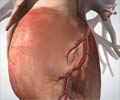In cardiac surgery patients, an association between postoperative delirium and prolonged loss of cognitive function has been identified by researchers.

While delirium has been studied quite extensively in other patient populations, including general medical and surgical patients and orthopedic surgery patients, few studies of delirium have targeted cardiac surgery patients. "With the aging of the patient population undergoing cardiac surgery and increases in survival after surgery, clinicians and patients are increasingly concerned with factors associated with quality of life, including cognitive status, as major outcomes of surgery," the authors write. "Whether postoperative delirium is associated with prolonged cognitive dysfunction has been unclear."
The researchers followed 225 patients, aged 60 to 90, who underwent either coronary artery bypass grafting (CABG) or heart valve replacement surgery at Beth Israel Deaconess Medical Center (BIDMC), UMass Memorial Medical Center or the Boston VA Medical Center, for one year after their surgeries, assessing them for both delirium and cognitive impairment.
"One of the real strengths of our study is that we assessed patients' cognitive function preoperatively and an average of five times during the year after surgery," said co-lead author Edward Marcantonio, MD, section chief for research in BIDMC's Division of General Medicine and Primary Care and professor of medicine at Harvard Medical School. "Previous research had shown an association between postoperative delirium and functional decline in activities of daily living [such as grooming and dressing, driving, shopping, preparing meals and managing medications and finances.] But, believe it or not, the one thing that's been most uncertain is the association between delirium and long-term cognitive difficulties. This study allowed us to accurately model the course of cognitive function and to compare the rate of recovery among patients with and without postoperative delirium."
The results showed that compared with patients who did not experience delirium, the 103 patients who developed delirium after cardiac surgery – 46 percent of the total – experienced a more significant drop in cognitive performance immediately following surgery, as determined by the Mini-Mental State Examination (MMSE). They also took significantly longer to recover back to their pre-surgical level of function than did patients who did not develop delirium. For example, five days after surgery, nearly half of those who did not develop delirium had returned to pre-operative levels of function while less than 20 percent of those who did develop delirium had returned to pre-operative level of function; six months after surgery, more than three-quarters of those without delirium had recovered cognitively compared to only 60 percent of those with delirium.
Although patients who developed delirium took longer to recover to their pre-operative levels of cognitive performance, they continued to improve in the weeks and months after surgery. Cognitive performance reached preoperative levels and stabilized one month after surgery in patients who did not develop delirium but continued to improve until six months after surgery in those with delirium.
Advertisement
Further cognitive screening at discharge may also identify patients who require closer, post-operative monitoring or tailored transitional care to enhance the return of cognitive functions. "Since patients who experience delirium continue to show improvement in cognitive function six months after surgery, extending additional rehabilitation services to these patients may have added benefits," said co-senior author Richard N. Jones, ScD, director of mental health and aging at Hebrew SeniorLife and assistant professor of medicine at Harvard Medical School.
Advertisement
"More than half a million heart surgeries are performed each year," said Marcantonio. "Our findings provide important information that might help doctors design interventions to improve the outcomes of older adults undergoing cardiac surgeries."
Source-Eurekalert










